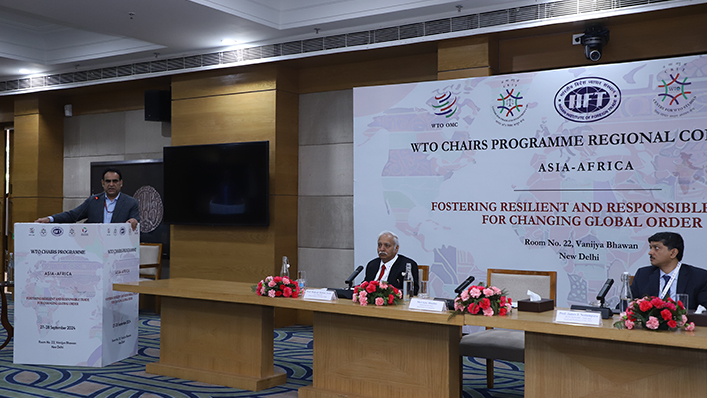
Speaking at the opening of the conference in the presence of the IIFT Vice-Chancellor, Professor Rakesh Mohan Joshi, WTO Deputy Director-General Xiangchen Zhang stressed the importance of the WTO Chairs Programme (WCP) network in fortifying the multilateral trading system and guiding both current and future trade negotiations. “Trade negotiations cannot succeed if only a few voices are heard,” he said. “Every country, regardless of size or wealth, has a stake in the system and should actively shape its future. Universities and academic institutions such as the WTO Chairs have a critical role to play.”
Ajay Bhadoo, Additional Secretary of the Department of Commerce in India, highlighted the rapid transformation of the global trade environment, driven by factors such as digital trade, sustainability goals, and supply chain resilience. “Asia and Africa are at the nexus of these changes,” he noted, emphasizing that these regions are pivotal in driving the next phase of global trade expansion, which must be inclusive, sustainable and equitable.
Throughout the conference, participants engaged in discussions on critical issues, including regional approaches to international trade, with experts calling for stronger connections between regions to promote “re-globalization” in the face of current global challenges.
Another key topic of discussion was the role of digital technology in empowering marginalized groups, including small businesses, women, and youth. Participants highlighted the WCP’s efforts in building resources to support this goal, stressing the need for inclusive digital policies.
The conference also explored how international trade could support sustainable climate actions, particularly in the areas of clean energy, agricultural sustainability, and green industrial policies. The vital importance of minerals essential for the transition to net-zero emissions, as well as the need for climate-resilient agricultural trade policies, was also discussed.
Ambassador Senthil Pandian, India’s Permanent Representative to the WTO, commended the WTO chairs’ efforts in advancing international trade knowledge across all regions. “This conference has underscored the immense potential within Asia and Africa and the opportunities to forge stronger partnerships to develop capacity in trade,” he said.
France’s Permanent Representative to the WTO, Ambassador Emmanuelle Ivanov-Durand, also emphasized the value of knowledge exchange. “It is even more valuable between countries from different continents where interests can be understood differently but where strong partnerships can be found,” she said. France is the largest donor of the WCP.
Ambassador Jung Sung Park, Deputy Permanent Representative of the Republic of Korea to the WTO, reaffirmed the importance of collaboration between Asia and Africa, which together account for approximately half of the WTO’s membership. He stressed that evidence-based research is crucial to shaping a more inclusive and sustainable global trade system, and praised the WCP for its role in bridging academia, policymakers and the public.
Julian Storm, Economic Counsellor at the Australian High Commission in India, represented Australia, a donor to the WCP, at the event. “Australia believes global trade must be inclusive, and growth must benefit developing economies,” he stated. “The best way to achieve this is by ensuring we have a WTO that is durable, fit for purpose, and works for all.”
The conference concluded with remarks from Satya Srinivas, Additional Secretary of the Department of Commerce in India and chief negotiator for the India-European Union free trade agreement, who praised the event for encouraging critical discussions on governance and sustainable development, particularly within the context of the UN Sustainable Development Goals.
The WTO Chairs Programme seeks to foster research, build capacity, and facilitate meaningful dialogue on international trade issues among policymakers and key stakeholders. This conference laid a robust foundation for future collaboration between the WTO, the Government of India and the wider regions of Asia and Africa, paving the way for strengthened partnerships and deeper engagement in shaping the global trade landscape.
Share
Reach us to explore global export and import deals